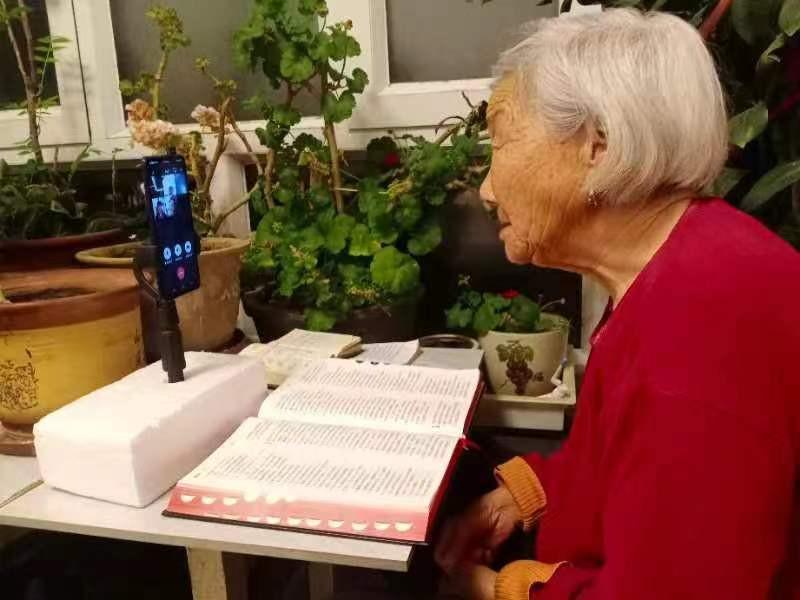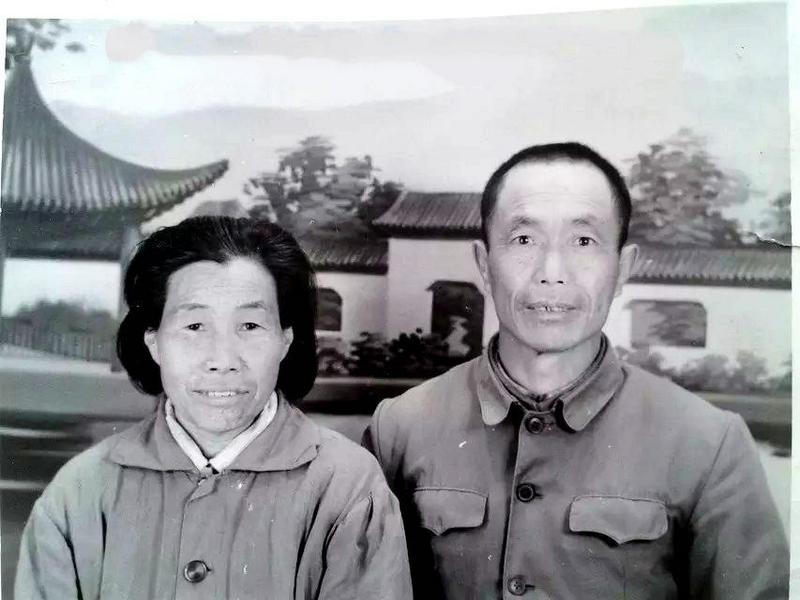Li Qingzhen, a native of Zhoukou, Henan Province, was born in the 1930s. In 1961, she married Song Dewu, a diligent and modest carpenter. The following year, their first son was born. What should have been a joyful time was overshadowed when Li Qingzhen developed a condition she described as "foolishness" during her pregnancy, which persisted for two years.
A turning point came in the autumn of 1964. While resting under a tree, she heard a clear voice: "Get up! Don't sleep! Go find Jesus!" Awakening, she asked, "Jesus, where are you?" Looking around, she saw a clear blue sky, the rising sun, and a peanut field before her. In that moment, she realized she had recovered from her condition.
"Foolishness" is how Li Qingzhen described her illness. She explained: "It was rheumatism from prenatal and postpartum. No medicine, Chinese or Western, could cure it. I was dying every day. In my despair, I lost my senses." At the time, she felt discontent with many things and resented those who worshipped Buddha, and harbored dissatisfaction toward her husband, who grew up as an orphan from a poor family and was illiterate and reserved. Though he helped families in need as a carpenter and was devoted to his work, he earned little. Li believed that her constant complaints and resentment had contributed to her illness.
Noticing that she had regained consciousness, the husband immediately set out with Li and their child on a journey to seek Jesus. Along the way, people avoided them, for after two years of illness, she could hardly move, with her head not turning and her body not moving, and she appeared almost like a wooden figure.
Eventually, they visited the home of an elderly Christian woman in her 60s. After praying and laying hands on Li Qingzhen, the woman explained that her condition was caused by rheumatism and qi stagnation and assured her it would heal within two days. She suggested Li's husband leave the child in her care while he returned to work. During the day, the elderly woman read the Bible to Li Qingzhen and taught her hymns. Each evening, her husband brought them home and returned the next morning, with Li Qingzhen singing the newly learned hymns along the way. This routine continued for three days, marking the beginning of Li Qingzhen and her husband's spiritual journey. In 1965, she was baptized.
Wonderful Experience, Responding to a Divine Call
A few months after her baptism, in the latter half of 1965, Li had a vision while praying, almost dreamlike, of life in the Northwest. She believed it was a revelation from God and accepted the call to pioneer there. In early 1966, her family received a notice that Xinjiang was seeking blacksmiths, masons, stonemasons, carpenters, and other craftsmen from across the country to assist with local construction. As a carpenter, Li's husband qualified. By then, the couple already had a second child, just over a year old. Despite the challenges, Li chose to obey God's call.
On June 12, 1966, leaving her parents, relatives, and friends in Henan behind, Li and her family boarded a train bound for Xinjiang. After three days and nights, they arrived in Urumqi. Although it was the provincial capital, living conditions were harsh. Li recalled, "Nothing but bricks and rubble; there wasn't a single decent thing." Their journey continued for another three days to a county town, where conditions were even more difficult.
Their final destination was Qinghe County, a newly developed area in Altay, northern Xinjiang, where extensive infrastructure work was in urgent need and craftsmen were in demand nationwide. After settling in, Li began thinking about how to share the gospel. One day, while walking through the town, she said, "Thank God, Jesus can save people," and was approached by a fellow villager from her hometown. Upon learning that she was a Christian, the villager invited her home. There, she found a light blue book beside the bed and discovered it was a copy of the Old and New Testaments in traditional Chinese characters. Bibles were rare at the time; even she did not own one. Together, they thanked the Lord and wept over the Bible. In that moment, Li realized, "Lord, we have come to this remote mountain valley in the Northwest, and You have been waiting for us!" This marked the beginning of her evangelistic work in the region.
Trekking Through Northwest China, Pioneering Amid Hardship
With the fellow villager's treasured Bible, a church was established in the region. Li began preaching to her neighbors and fellow villagers, often bringing her own food to the countryside. She treated patients using traditional Chinese medicine techniques she had learned as a village doctor, including acupuncture, cupping, massage, and acupressure. She also shared the gospel through popular forms of Chinese storytelling, such as clapper talks, skits, folk songs, and hymns. Gradually, more people came to believe in Jesus. The villager donated her Bible to the church, and during each gathering, Li would copy the day's Bible passages onto stationery for attendees to take home and continue reading. Through these studies, some illiterate believers even learned to read and were eventually able to read the entire Bible.
However, the good times were short. During the Cultural Revolution, Christianity was condemned as a "monster and demon" sect, and her family became a target of persecution. Their home was raided, furniture and two pigs were confiscated, and they were locked in horse stables and cattle pens, forced to eat husks and vegetable scraps while performing manual labor. At times, they were beaten; Li suffered a severe head injury that caused the loss of all her teeth, leaving her with constant tinnitus and frequent sleepless nights. She endured these trials through prayer, Bible reading, and devotional practices, even writing books on her faith. Her husband was once beaten unconscious but gradually recovered through her care and prayers.
Despite the hardships, her evangelistic ministry continued. During the Cultural Revolution, more than a dozen people secretly studied the Bible and hymns with her. Reflecting on her experiences of persecution, Li affirmed her unwavering faith in God's love: "Thank the Lord! No matter how much we were oppressed or beaten, who could separate us from the love of Christ? Was it hunger? Was it beatings? Was it persecution? Nothing could separate us from the love of Christ."
Starting in 1979, Christian activities in the region gradually received approval from local religious authorities. Her church was officially recognized as a Christian activity center and built the only church in the area. Recalling the moment, Li said with excitement, "My husband built a large, tall cross and erected it on top." People from several surrounding villages attended the gatherings, sometimes numbering over 100. In addition to Sunday services, the church also held midweek gatherings on Wednesdays and Fridays, with choir practice on Saturdays.
In 1986, Li reached a milestone in her ministry—ordination as a pastor. In March, her husband sold the family's three pigs to fund her trip to Urumqi for a three-month training course, while he stayed home to care for their six children. During the course, she systematically studied the Gospel of John. In May 1986, Li was ordained as a pastor. She received two sets of pastoral materials sent by Fan Chenguang (now honorary chairperson and president of Urumqi CC&TSPM), then a student at Yanjing Theological Seminary, and was so overjoyed she could hardly sleep. After completing an internship with an elderly pastor in Urumqi, Pastor Li returned to continue her ministry.
At the same time, Pastor Li committed to nurturing faith within her family. She and her husband have eight children, all of whom are Christians, with three serving as full-time ministers. Some of her descendants are committed to ministry in the northwest. One of her sons met his future wife while working in Shenzhen; upon learning of Pastor Li's ministry, she was deeply inspired. After their marriage, she joined the church in Qinghe County, contributing significantly with her training in speaking, singing, and piano, further supporting the growth of the congregation.
Studying in Old Age, With Hope in Mind
Although the church had grown in membership, Pastor Li lamented the lack of co-workers with formal theological training. She had hoped that younger members might study elsewhere, but most were reluctant to leave their jobs, and middle-aged members were busy supporting their families. With younger co-workers already serving in ministry and her third son, a graduate of Fujian Theological Seminary, frequently providing training at the church, Pastor Li, in her 80s, was recommended to pursue formal study herself.
Over six years, Pastor Li completed a study of the entire Bible, from Genesis to Revelation, sharing her insights with church members back home. During this period, she also learned to use a smartphone and live-streaming software.
Her studies were cut short by a tearful call from a church member: the congregation's meeting venue had been deemed unsafe. In her late 90s, Pastor Li returned to the northwest to restore the church.
The cross at the meeting site had been torn down, and gatherings had ceased. Undeterred, she quickly organized the congregation, resuming meetings under a temporary shed and using online methods she had learned during her studies. Meanwhile, she negotiated with religious authorities to repair or rebuild the church. Reflecting on these challenges, Pastor Li said, "Serving the Lord isn't under the shade of trees or in a warm, cozy environment; it is amidst wind, rain, thunder, and lightning. The more we face such trials, the more it trains us, drawing us closer to the Lord and deepening our faith."
Looking back on more than 60 years of ministry, Pastor Li affirmed: "Our labor in the Lord is not in vain. As long as we are faithful and follow Him to the end, He will reward us." Despite currently meeting under a simple shed, she remains hopeful, "We are waiting, patiently waiting, and our only hope is for Jesus' Second Coming."
Originally published by the Gospel Times
- Edited by Karen Luo and translated by Poppy Chan













